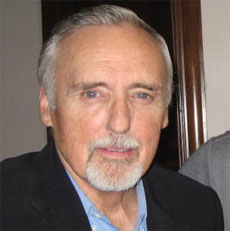Dennis Hopper Goes to Breeder’s Cup, Despite Prostate Cancer

Actor Dennis Hopper attended the Breeder’s Cup, in Santa Anita on Saturday, in support of the VFoundation for Cancer Research. The Easy Rider actor, who is a big fan of thoroughbred horse racing, attended the event despite being treated for prostate cancer. Last month, Hopper revealed that he was being treated in an experimental program at University of Southern California, and now says that he has been battling the disease for the last nine years. According to Hopper, the current treatment “… has great promise. Everything’s good right now.”
We’ve already done a few blogs about prostate cancer: What is prostate cancer?; What is PSA, and how good a measure of prostate disease is it? In this blog we will discuss risk and prevention of prostate cancer, according to the National Cancer Institute.
Avoiding risk factors and increasing protective factors may help prevent cancer. Avoiding cancer risk factors such as smoking, being overweight and lack of exercise may help prevent certain cancers. Increasing protective factors such as quitting smoking, eating a healthy diet, and exercising may also help prevent some cancers.
The following risk factors may increase the risk of prostate cancer:
- Age: Prostate cancer is rare in men younger than 50 years of age. The chance of developing prostate cancer increases as men get older.
- Family history of prostate cancer: A man whose father, brother, or son has had prostate cancer has a higher-than-average risk of prostate cancer.
- African-American men are more likely than white men to develop prostate cancer and die from it.
- The prostate needs male hormones to work the way it should. The main male sex hormone is testosterone. Testosterone helps the body develop and maintain male sex characteristics. Testosterone is changed into dihydrotestosterone (DHT) by an enzyme in the body. DHT is important for normal prostate growth but can also cause the prostate to get bigger and may play a part in the development of prostate cancer
- Folic acid: A 10-year study showed that the risk of prostate cancer was increased in men who took supplements of folic acid (a vitamin in the vitamin B complex).
- Dairy and calcium: A diet high in dairy foods and calcium may cause a small increase in the risk of prostate cancer.
The following protective factors may decrease the risk of prostate cancer:
- Folate: A 10-year study showed that prostate cancer risk was lowered in men who had enough folate in their diets. Folate is found in whole-grain breads and cereals, liver, green vegetables, orange juice, lentils, beans and yeast.
- Finasteride: The Prostate Cancer Prevention Trial (PCPT) studied whether the drug finasteride can prevent prostate cancer in healthy men 55 years of age and older. Finasteride is a drug that blocks the enzyme that changes testosterone into dihydrotestosterone (DHT). DHT may play a part in the development of prostate cancer. The prevention study showed there were fewer prostate cancers in the group of men who took finasteride compared to the group that did not take it. However,the men in the finasteride group who did have prostate cancer had more aggressive class of tumors. The number of deaths from prostate cancer was the same in both groups.
The following have been proven not to affect the risk of prostate cancer, or their effects on prostate cancer risk are not known:
- Selenium and vitamin E: The Selenium and Vitamin E Cancer Prevention Trial studied whether taking vitamin E and selenium (a mineral) will prevent prostate cancer. The selenium and vitamin E were taken separately or together by healthy men 50-55 years of age and older. The study showed that selenium and vitamin E did not decrease the risk of prostate cancer.
- Diet: It is not known if decreasing fat or increasing fruits and vegetables in the diet helps decrease the risk of prostate cancer or death from prostate cancer. Cancer prevention clinical trials are used to study ways to prevent cancer.
Clinical Trials:
Clinical trials are used to study ways to lower the risk of developing certain types of cancer. Some cancer prevention trials are conducted with healthy people who have not had cancer but who have an increased risk for cancer. Others consist of people who have had cancer and are trying to prevent a recurrence of the same type, or to lower their chance of developing a new type of cancer. Still other trials are done with healthy volunteers who are not known to have any risk factors for cancer.
The purpose of some cancer prevention clinical trials is to find out whether actions people take can prevent cancer. These may include eating fruits and vegetables, exercising, quitting smoking, or taking certain medicines, vitamins, minerals, or food supplements.
New ways to prevent prostate cancer are being studied in clinical trials in many parts of the country.
Information about clinical trials can be found in the Clinical Trials section NCI’s Website.
Check for clinical trials in NCI’s Cancer Clinical Trials Registry for prostate cancer prevention trials that are accepting patients.
For more information:
| Resounding Health(tm) Prostate Cancer |
























0 comments